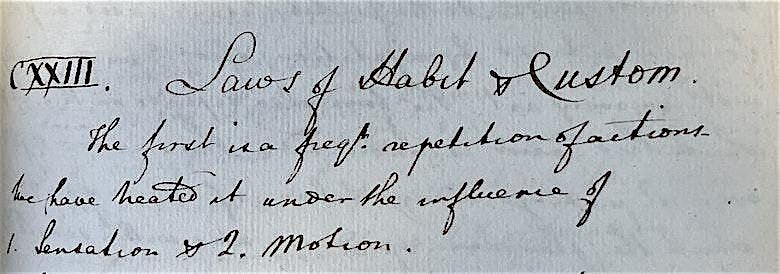The Body, Habit, and the Internalization of Experience before Modernity
Schedule
Thu, 03 Apr, 2025 at 10:30 am to Fri, 04 Apr, 2025 at 12:00 pm
Location
Lancaster Castle | Lancaster, EN

About this Event
The Body, Habit, and the Internalization of Experience before Modernity
The Castle Suite, Lancaster Castle
April 3-4 2024
April 3: 10.30-16.30
April 4: 10.00-12.00
Featuring:
Alex Wragge-Morley (Lancaster University)
Carmel Raz (Cornell University & Max Planck Institute for Empirical Aesthetics)
Holly Fletcher (University of Manchester)
Frances Gage (SUNY Buffalo State University)
Kristin Hussey (Newcastle University)
Racha Kirakosian (Wissenschaftskolleg Berlin & Universität Freiburg)
Abstract:
Today, philosophers and neuroscientists are increasingly interested in the ways that mind and body can be shaped by the acquisition of habits. Rather than privileging the autonomy of mind and body, thinkers such as Annemarie Mol and Alva Noë increasingly regard mind and body as products of extended interactions with the environment, where habitual patterns of action give rise to new mind-body configurations.
This workshop explores the remarkably important role that habit had in medieval and early modern ideas about the interrelationships between mind, body, and the external world. From the scholastics of the 13th century all the way through to medics such as William Cullen in the 18th century, medieval and early modern thinkers took a keen interest in the ways that habit could give rise to new dispositions – behavioural tendencies that emerged without reflection or deliberation.
Such ideas are particularly important in helping us to understand how medieval and early modern thinkers related to what we now think of as the arts, whether in the production or consumption of ‘aesthetic’ experiences. Thus medieval thinkers regarded the contemplation of religious images as a way of cultivating the habits that would give rise to virtuous dispositions, whilst early modern medics regarded the exposure to certain colours and images as contributing to the formation of healthy bodily dispositions.
We therefore use the broad category of habit to help us grasp how early modern people related mind and body to the external world, and in particular their ways of relating the body to its environments.
Paper Titles:
Carmel Raz: “Art does not deliberate”: Toward a History of Automaticity and Musical Performance
Holly Fletcher: "Doing Body Size": Enacting Fatness and Thinness through Habit in Early Modern Germany.
Frances Gage: "No better make-up than cheerfulness": Female Health and Habits of Self-Adornment in Early Modern Italy
Kristin Hussey: Rhythmic History: A framework for bodily rhythms and health
Alex Wragge-Morley: Habit, the Body and the Meanings of Aesthetic Experience in the 18th Century
Where is it happening?
Lancaster Castle, Castle Hill, Lancaster, United KingdomEvent Location & Nearby Stays:
USD 0.00
